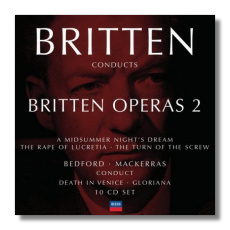
The Internet's Premier Classical Music Source
Related Links
- Britten Reviews
- Latest Reviews
- More Reviews
-
By Composer
-
Collections
DVD & Blu-ray
Books
Concert Reviews
Articles/Interviews
Software
Audio
Search Amazon
Recommended Links
Site News
 CD Review
CD Review
Benjamin Britten

The Operas, Volume 2
- A Midsummer Night's Dream, Op. 64 1
- Phaedra 2
- Rape of Lucretia, Op. 37 3
- Turn of the Screw, Op. 54 4
- Death in Venice, Op. 88 5
- Gloriana, Op. 53 6
1,3 Dame Janet Baker, mezzo-soprano
1 Elizabeth Harwood, soprano
3-5 Sir Peter Pears, tenor
3,5 John Shirley-Quirk, baritone
3 Heather Harper, soprano
4 Jennifer Vyvyan, soprano
6 Bryn Terfel, tenor
6 Philip Langridge, tenor
1 London Symphony Orchestra/Benjamin Britten
2 English Chamber Orchestra/Steuart Bedford
3 English Chamber Orchestra/Benjamin Britten
4 English Opera Group Orchestra/Benjamin Britten
5 English Chamber Orchestra/Steuart Bedford
6 Welsh National Opera Orchestra & Chorus/Charles Mackerras
Decca 475602-9 10CDs 667m ADD/DDD
After my review of Decca's Volume 1 of the Britten operas, I now find myself faced with this splendid second set which groups together The Rape of Lucretia (1946), Gloriana (1953), The Turn of the Screw (1954), A Midsummer's Night Dream (1960) and Death in Venice (1973). The set also includes the cantata, 'Phaedra' (1976) which was premièred less than 6 months before the composer's death.
As I stated in my first foray, time simply precludes me from going into details but for continuity's sake, I will outline Britten's specific messages for these five operas as well. Lucretia (the destruction of virtue through man's lust), Gloriana (A reminder of the joys and woes of one of England's greatest monarchs) A Midsummer's Night Dream (a re-enactment of Shakespeare's comedy to delight and amuse), The Turn of the Screw (the tragic tensions emanating from the world of the spirits and their dire consequences) Death in Venice (the composer's self portrait of his inner torment and outer struggle with a hypocritical age).
Not all five works are conducted by Britten, but the ones he does conduct (Dream, Lucretia and Screw) are unsurpassable in their intensity and rhythmic control, although the composer's subdued wit is very much in evidence in Dream. Steuart Bedford's 'death in Venice is a profound study of Britten's anguished and ambivalent soul. Having been close friends helps Bedford in more ways than one to bring out the many hidden shades of this marvellous and very sparse score.
Charles Mackerras clothes 'Gloriana' with all the nobility and pathos that is associated with the main character, and although he is not a renowned Britten interpreter, this rarely performed opera is given a very vigorous and dignified reading. Where performers and engineers are concerned, I certainly have no qualms on the peerless standards achieved. Full marks to all whose indefatigable enthusiasm and consummate artistry helped realize this project of immense proportions and incomparable beauty.
Copyright © 2005, Gerald Fenech




















